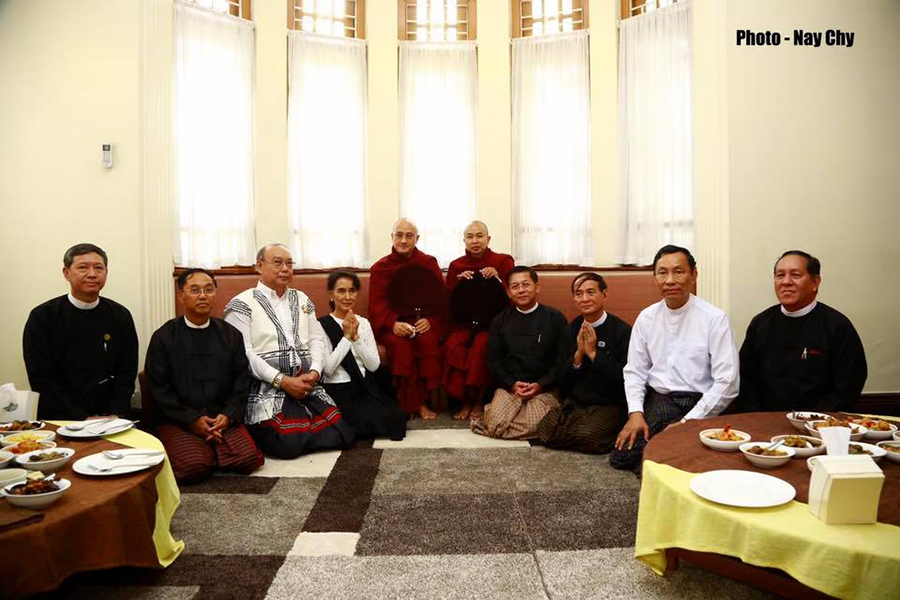Speculation is mounting that the imminent arrival of a new president will be accompanied by a shakeup of the moribund cabinet. Will U Htin Kyaw’s successor choose more able replacements for currently non-performing ministers? To put it simply, will the new president put the right people in the right places? The government’s new direction and vision for the economy will also be closely watched. So expectations will only increase.
Many theories have emerged on the reason for U Htin Kyaw’s sudden departure. But pundits and political insiders say it had long been in the works; it was never his desire to serve as president for a long period, and he only accepted the position at the direct request of his former schoolmate, State Counsellor Daw Aung San Suu Kyi.
Almost certainly with an eye on the elections in 2020, senior leaders including Daw Aung San Suu Kyi have decided it is time to shake up the government and inject some new blood.
In a brief interview with local media at Parliament on Friday, First Lady Daw Su Su Lwin revealed that U Htin Kyaw had not expected to spend too much time in the presidential palace, and had expected to vacate the throne before long. Does this mean the National League for Democracy leaders were under the illusion that amending the Constitution would be possible in the first year of its administration?
U Htin Kyaw lived simply, without political ambition and untainted by any hint of corruption. Unlike some of his predecessors, he refrained from seeking personal gain from his position, as is common practice among Myanmar’s infamous politicians and generals. In reality he was not a very active president, treating the role as largely ceremonial. After all, Daw Aung San Suu Kyi had informed us all that she would be above the president.
President U Win Myint?
If he is elected, former political prisoner U Win Myint will be Myanmar’s 10th president. Like U Htin Kyaw, he is a decent person who is both apparently free of corruption and a loyalist to Daw Aung San Suu Kyi.
Unlike U Htin Kyaw, U Win Myint was not educated overseas and has had less exposure to the outside world, but he is known to be a quick learner and highly adaptable.
U Win Myint’s history of butting heads with the Myanmar Army’s representatives in Parliament as House speaker could complicate his relations with the military’s top brass. The 2008 Constitution would grant him full executive and presidential powers. If he should seek to exercise this power, he will be forced to confront Army generals who wield significant political and economic power.
Most importantly, assuming Daw Aung San Suu Kyi gives him her blessing, he will wield more power within the administration, in contrast to U Htin Kyaw’s approach of not intervening.
Many people, including those in business circles, are expecting a major shakeup in the cabinet, with serious implications for the performance of the government and the business sector. It will also be interesting to see the degree to which U Win Myint involves himself in the country’s ongoing peace process.
The U Shwe Mann Factor
The current administration comprises a mix of ministers who were handpicked and appointed by the ruling party, and others nominated by U Shwe Mann, another ally of Daw Aung San Suu Kyi.

The powerful general was the No. 3 official in the former regime and served as House speaker. He was named head of the then-ruling Union Solidarity and Development Party in 2013 but was purged from the position in 2015 due to tensions between himself and then President U Thein Sein, and was ultimately ejected from the party in 2016. Under the NLD-led administration U Shwe Mann served in a new role as chairman of the new Commission for the Assessment of Legal Affairs and Special Issues. He retains several key political allies.
One of these is U T. Khun Myat, the Kachin politician and former militia leader in Northern Shan State who has become the new Lower House speaker. Was a deal done between Daw Aung San Suu Kyi and U Shwe Mann? Perhaps. U T. Khun Myat was a USDP lawmaker until his resignation from the party last year. Since then he has served as an independent.
Several cabinet members, including U Kyaw Tint Swe, minister for the Office of the State Counsellor, also served under the former repressive regimes, working with top brass including Senior General Than Shwe, General Khin Nyunt, General Maung Aye and General Shwe Mann. With the exception of U Shwe Mann, they have all retired.
The appointment of these ministers close to the U Shwe Mann faction created tension and unhappiness among NLD politicians.
In the coming weeks, we can expect to see further changes in the national leadership — including, hopefully, in the Cabinet. All eyes will be on the arrival of new faces and the jockeying for position among power factions. As the country continues its slide — real or imagined — toward “failed state” status, precisely who will benefit from these changes is an open question. Stay tuned.

















